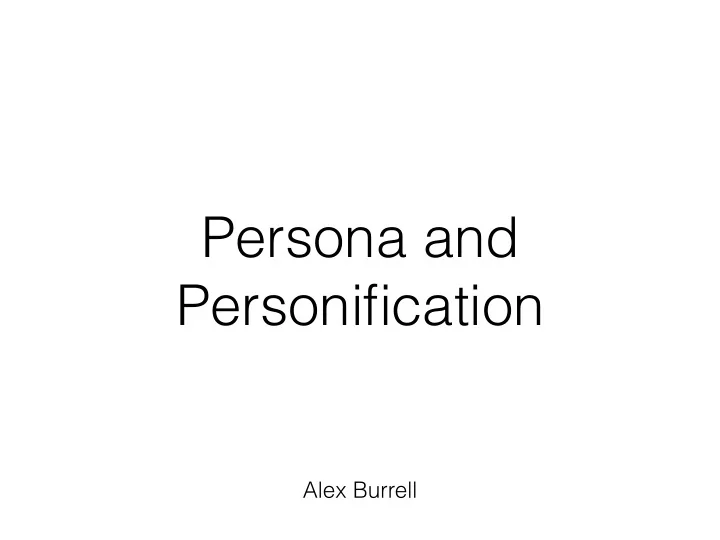

Persona and Personification Alex Burrell
• Why is it important to consider personality in dialog system design/development? • How can personality be generated for dialog systems?
• Patterns seen in human-human interactions extend to human-computer interactions • Gender and ethnicity • Politeness • Team mentality • Reciprocity • Titles and expertise
Gender and ethnicity • Using a male-sounding voice or a female-sounding voice affected the user's perception of the computer's helpfulness and intelligence on stereotypically masculine and feminine topics • With an image associated with the computer, the user considered the computer more trustworthy, persuasive, and intelligent if the image matched the user's race
Politeness • After completing a task with Computer A, users evaluated Computer A's performance/helpfulness • If they used Computer A to evaluate, their reviews were more positive • If they switched to Computer B to evaluate A, their reviews were more negative/honest
Team mentality • When user-computer pairs were referred to as a team (e.g. Team Blue) users considered their computer to be: • Friendlier • More helpful • More intelligent
Reciprocity • If the computer has been particularly helpful to the user, the user will work harder to help the computer • If the user moves to a different computer, this correlation disappears • When asked personal questions, users gave short, vague answers • When the personal questions were prefaced with a factual but personal-sounding disclosure from the computer, they gave longer, more detailed answers
Reciprocity • "This computer has been configured to run at speeds up to 266 MHz. But 90% of computer users don’t use applications that require these speeds. So this computer rarely gets used to its full potential. What has been your biggest disappointment in life?" • "There are times when this computer crashes for reasons that are not apparent to its user. It usually does this at the most inopportune time, causing great inconvenience to the user. What have you done in your life that you feel most guilty about?"
Titles and expertise • Some users viewed news and entertainment segments on a "News and Entertainment TV" • Some users viewed news on a "News TV" and entertainment on an "Entertainment TV" • Group 2 rated the programs much higher than Group 1, even though the only difference was their perception of the TV's specialization
• These patterns hold even when the computer makes no attempt to act human (besides using human language to interact) • Does not use a recorded voice • No self-reference • No pretended emotions or opinions • Every human in the study acknowledges that it would be "ludicrous" to apply those social patterns to computers
Similarity-attraction • Humans tend to prefer traits similar to their own • If content is presented in a way that matches the user's personality, it immediately becomes more likable and credible • Could be achieved through: • Choice of language (e.g. dominant vs. submissive, extroverted vs. introverted) • Sound of voice (e.g. gender, prosody, pitch)
Consistency-attraction • Humans are sensitive to the appropriateness of the medium to the content • Language and voice should be chosen to match the content/task/message • Efforts to maximize similarity-attraction can backfire if it causes inconsistency between the content and how it is presented
• Why is it important to consider personality in dialog system design/development? • How can personality be generated for dialog systems?
• "Right, I mean, Le Marais is the only restaurant that is any good." • "It seems to me that Le Marais isn’t as bad as the others. It’s a french, kosher and steak house place. It has friendly servers, you know but it’s somewhat expensive, you know!"
Generating extroversion Feature Extrovert speech Introvert speech Topics Many Single Polarity Positive Negative Self-reference Many Few Sentence length Shorter Longer Pauses Few Many Parts of speech Verbs, adverbs Nouns, adjectives Negations Few Many Emphasis words Many Few Formality Informal Formal etc...
Generating extroversion • Parameterize features that differentiate introverted and extroverted utterances • Hypothesis: By adjusting these parameters, sentences can be generated that humans would identify as more extroverted or introverted
Generating extroversion: Evaluation • On a scale of 1 (introverted) to 7 (extroverted), human judges: • Gave introverted sentences 2.96 (average) • Gave extroverted sentences 5.98 (average) • Human judges also rated sentenced generated with random parameters, and used that to train a model to automatically assign extroversion to utterances
Beyond extroversion • "The Big Five" personality traits this could be extended to: • Neuroticism • Agreeableness • Openness to experience • Conscientiousness
• Why is it important to consider personality in dialog system design/development? • How can personality be generated for dialog systems?
• Why is it important to consider personality in dialog system design/development? • Understand how users will subconsciously respond to your system • Increase likability, credibility • How can personality be generated for dialog systems? • Define features of utterances that are associated with different personality traits • Use those features to generate sentences, or identify the user's personality
Recommend
More recommend